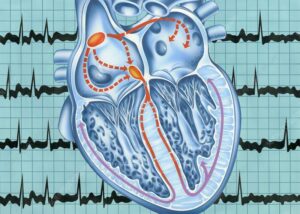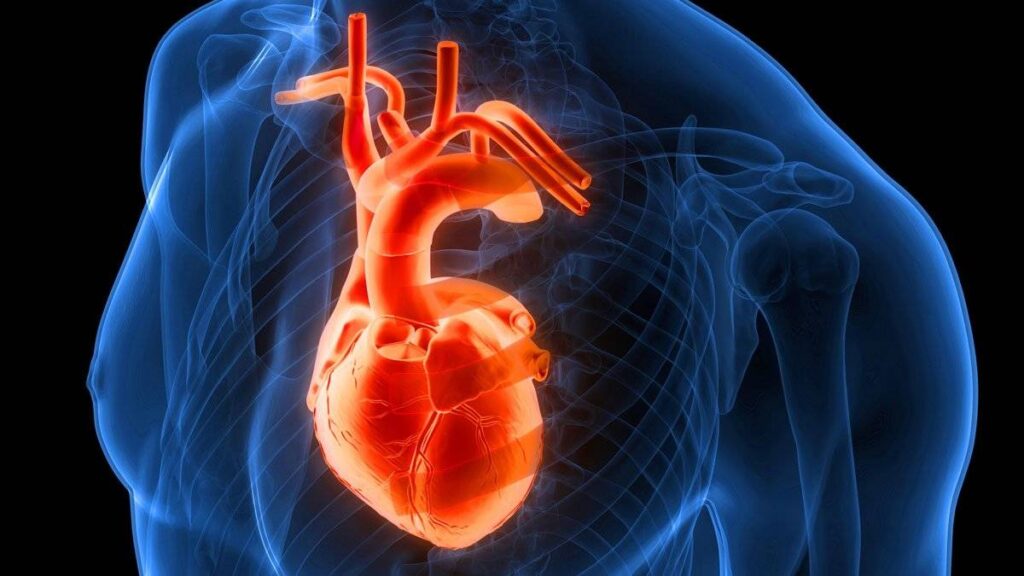Have you ever felt your heart racing unexpectedly, or experienced a fluttering sensation in your chest? It could be more than just a momentary feeling—atrial fibrillation (AFib), a common heart rhythm disorder, might be at play. While some people may only feel mild symptoms, for others, AFib can lead to serious complications if not treated.
In this blog, we’ll dive into what atrial fibrillation is, its causes, symptoms, and how it can affect your heart. We’ll also explore the treatment options and management strategies to keep you healthy and reduce the risk of complications.
What is Atrial Fibrillation (AFib)?
 Atrial fibrillation (AFib) is a common heart rhythm disorder where the heart’s upper chambers (the atria) beat irregularly and out of sync with the lower chambers (the ventricles). This leads to an irregular and often rapid heart rate that can interfere with the heart’s ability to pump blood efficiently.
Atrial fibrillation (AFib) is a common heart rhythm disorder where the heart’s upper chambers (the atria) beat irregularly and out of sync with the lower chambers (the ventricles). This leads to an irregular and often rapid heart rate that can interfere with the heart’s ability to pump blood efficiently.
In a healthy heart, the electrical signals follow a regular pattern, ensuring the heart beats steadily. In AFib, these signals become disorganized, causing the atria to quiver or fibrillate instead of contracting normally. As a result, blood flow can become inefficient, and the heart may not pump blood as well as it should.
Understanding AFib is crucial because, if left untreated, it can increase the risk of blood clots, which can travel to the brain and cause a stroke. That’s why recognizing the symptoms and seeking treatment is important for your overall heart health.
What Causes Atrial Fibrillation?
Atrial fibrillation (AFib) can be caused by a variety of factors, ranging from underlying heart conditions to lifestyle choices. Here are the most common causes:
- Heart Disease
Coronary artery disease (CAD), where the heart’s arteries become narrowed or blocked, can lead to AFib. Similarly, people with heart valve issues or heart failure are more likely to develop AFib due to the stress these conditions place on the heart.
- High Blood Pressure (Hypertension)
Consistently high blood pressure puts strain on the heart and can cause the heart’s atria to become enlarged or stiff. This can lead to electrical disturbances and trigger AFib.
- Diabetes
People with diabetes are at higher risk for AFib, as the condition often contributes to high blood pressure and obesity, both of which are risk factors for the disorder.
- Obesity
Being overweight or obese increases the likelihood of developing heart disease, high blood pressure, and sleep apnea—all conditions that are linked to AFib.
- Alcohol Consumption
Drinking excessive amounts of alcohol, particularly in binge drinking, can trigger episodes of AFib, a phenomenon often referred to as “holiday heart syndrome.”
- Smoking
Smoking damages blood vessels and raises the risk of developing heart disease, which in turn increases the risk of AFib. It also contributes to higher blood pressure and reduced oxygen levels in the blood.
- Sleep Apnea
Untreated sleep apnea (a condition where breathing stops and starts during sleep) can increase the risk of AFib due to its effects on blood oxygen levels and heart function.
- Age
The risk of developing AFib increases with age, particularly after the age of 60. As the heart’s electrical system naturally changes with age, it may become more prone to irregular rhythms.
- Genetics
A family history of AFib can increase your chances of developing the condition, as there may be a genetic predisposition to heart rhythm issues.
- Thyroid Disorders
An overactive thyroid (hyperthyroidism) can also cause AFib, as it accelerates the heart rate and disrupts the normal rhythm.
In many cases, a combination of these factors contributes to the development of AFib. Understanding these causes is crucial for preventing and managing the condition effectively.
Symptoms of Atrial Fibrillation
- Palpitations (feeling of a rapid, irregular heartbeat)
- Dizziness or lightheadedness
- Shortness of breath (especially during physical activity)
- Fatigue or unusual tiredness
- Chest discomfort or pain
- Weakness or feeling faint
- Sweating without exertion
- Difficulty exercising or performing daily activities
- Confusion or feeling mentally foggy
If you experience any of these symptoms, it’s important to seek medical advice to properly diagnose and manage AFib.
Is AF a Serious Heart Problem?
 Yes, atrial fibrillation (AFib) can be a serious heart problem if left untreated. While it may not always cause immediate symptoms, AFib can lead to complications that can significantly affect your health. Some of the risks associated with AFib include:
Yes, atrial fibrillation (AFib) can be a serious heart problem if left untreated. While it may not always cause immediate symptoms, AFib can lead to complications that can significantly affect your health. Some of the risks associated with AFib include:
- Increased Risk of Stroke
AFib causes blood to pool in the heart’s upper chambers, which increases the risk of blood clots. These clots can travel to the brain, causing a stroke.
- Heart Failure
Over time, AFib can weaken the heart. The irregular beating can cause the heart to work harder, leading to heart failure, where the heart struggles to pump blood effectively to the rest of the body.
- Blood Clots
As mentioned, the risk of blood clots is higher in people with AFib. These clots can block blood vessels in the brain, lungs, or other parts of the body, leading to dangerous health complications.
- Increased Heart Rate
A high, irregular heart rate associated with AFib can damage the heart muscle and lead to further complications if not controlled.
While AFib can often be managed with proper treatment, it’s important to seek medical help as soon as symptoms arise to prevent these serious complications and maintain a healthy heart.
Managing Atrial Fibrillation

Managing atrial fibrillation (AFib) involves a combination of lifestyle changes, medications, and sometimes medical procedures to help control the heart’s rhythm and prevent complications. Here’s how you can manage AFib effectively:
Lifestyle Changes
- Healthy Diet: Eating a heart-healthy diet rich in fruits, vegetables, whole grains, and lean proteins can help manage blood pressure and cholesterol, which are critical for heart health.
- Regular Exercise: Physical activity can strengthen the heart, improve circulation, and help maintain a healthy weight. Always consult your doctor about the best type of exercise for your condition.
- Weight Management: Maintaining a healthy weight helps reduce the risk of high blood pressure and other conditions that can worsen AFib.
- Limiting Alcohol: Excessive alcohol can trigger AFib episodes, so it’s important to limit alcohol consumption or avoid it entirely.
- Quitting Smoking: Smoking damages blood vessels and raises the risk of heart disease. Quitting can help improve heart function and reduce AFib symptoms.
Monitoring Heart Rate
Medications
- Blood Thinners: To reduce the risk of blood clots and stroke, doctors often prescribe blood thinners like warfarin or newer medications like dabigatran or apixaban. These medications help prevent the formation of clots in the atria.
- Rate Control Medications: These medications help control the heart rate and prevent the heart from beating too fast. Common options include beta-blockers (like metoprolol) and calcium channel blockers (like diltiazem).
- Anti-arrhythmic Medications: These medications help maintain a regular heart rhythm by controlling the electrical impulses in the heart. Amiodarone and flecainide are examples of these drugs.
Medical Procedures
- Cardioversion: A procedure in which the heart is restored to its normal rhythm using either electrical shock or medication.
- Ablation: In cases where medications don’t work, catheter ablation may be recommended. This procedure destroys small areas of tissue in the heart that are causing irregular electrical signals.
- Pacemaker: If AFib is causing a very slow heart rate, a pacemaker may be implanted to help regulate the heartbeat.
By following these management strategies, people with AFib can live full, active lives and reduce their risk of complications like stroke and heart failure. Always work closely with your healthcare provider to determine the best treatment plan for your specific situation.
When to Seek Medical Attention for Atrial Fibrillation
If you experience sudden or severe symptoms like chest pain, shortness of breath, dizziness, fainting, or a very rapid or irregular heartbeat, seek emergency medical care immediately. These could be signs of a serious complication from atrial fibrillation, such as a heart attack or stroke.
Even if your symptoms are mild or come and go, it’s important to see a doctor promptly for proper diagnosis and management. Early treatment can reduce your risk of complications and improve your quality of life.
Don’t wait—take control of your heart health today by consulting an expert.
Click the button below to connect with an experienced online cardiologist at MantraDoc who can help you manage AFib safely and effectively.
Consult Online Cardiologist
 Atrial fibrillation (AFib) is a common heart rhythm disorder where the heart’s upper chambers (the atria) beat irregularly and out of sync with the lower chambers (the ventricles). This leads to an irregular and often rapid heart rate that can interfere with the heart’s ability to pump blood efficiently.
Atrial fibrillation (AFib) is a common heart rhythm disorder where the heart’s upper chambers (the atria) beat irregularly and out of sync with the lower chambers (the ventricles). This leads to an irregular and often rapid heart rate that can interfere with the heart’s ability to pump blood efficiently.

 Yes, atrial fibrillation (AFib) can be a serious heart problem if left untreated. While it may not always cause immediate symptoms, AFib can lead to complications that can significantly affect your health. Some of the risks associated with AFib include:
Yes, atrial fibrillation (AFib) can be a serious heart problem if left untreated. While it may not always cause immediate symptoms, AFib can lead to complications that can significantly affect your health. Some of the risks associated with AFib include: